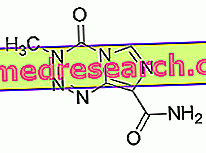Temozolomide is an anticancer drug belonging to the class of alkylating agents. The structure of temozolomide is analogous to that of dacarbazine (another anticancer medicine). In particular, temozolomide is an imidazotetrazene derivative.

Temozolomide - Chemical Structure
Indications
For what it uses
Temozolomide is indicated for the treatment of:
- Glioblastoma multiforme;
- Malignant glioma.
Temozolomide can also be given in combination with radiotherapy.
Warnings
The combination of temozolomide and radiotherapy may promote the contraction of a lung infection called Pneumocystis jirovecii pneumonia. Therefore, patients should be kept under close supervision, in order to identify in a timely manner the possible onset of this infection.
Because temozolomide is toxic to blood cells, patients on the drug should undergo regular blood tests.
Patients over 70 years of age - on temozolomide therapy - are at greater risk of developing infections, bruises or abnormal bleeding.
Attention should be paid to the administration of temozolomide in patients with hepatic and / or renal diseases.
Temozolomide should not be used in children under the age of 3 years.
Since temozolomide can cause tiredness and drowsiness, driving and using machines is not recommended.
Interactions with high drugs
Concomitant administration of temozolomide and valproic acid (a drug used in the treatment of epilepsy) may cause a reduction in the rate of elimination of temozolomide itself.
Myelosuppression (ie bone marrow suppression) induced by temozolomide may be increased by the concomitant administration of myelosuppressive drugs as well.
Food reduces the absorption of temozolomide, therefore, the drug should be taken between meals.
In any case, it is necessary to inform the doctor if you are taking - or if you have recently been - medicines of any kind, including non-prescription drugs, herbal and / or homeopathic products.
Side effects
Temozolomide can cause various types of side effects, although not all patients experience them. This happens because each individual has their own sensitivity to the drug. Therefore, it is not said that all adverse effects occur with the same intensity in each patient.
The following are the main side effects that may occur during therapy with temozolomide.
Myelosuppression
The myelosuppression induced by temozolomide is considered the most significant negative effect of this drug. Bone marrow suppression results in reduced blood cell production (reduced hematopoiesis) which can lead to:
- Anemia (decrease in hemoglobin blood levels), the main symptom of the onset of anemia is the feeling of physical exhaustion;
- Leukopenia (decrease in white blood cell levels), with increased susceptibility to contraction of infections;
- Plateletopenia (decrease in the number of platelets), this leads to the appearance of bruising and abnormal bleeding with an increased risk of bleeding.
Blood cell count is inversely proportional to the dose of temozolomide administered.
In some cases, it may be necessary to temporarily suspend treatment with the drug to allow the bone marrow to recover its functionality.
Gastrointestinal disorders
Therapy with temozolomide may cause nausea, vomiting, diarrhea or constipation.
Nausea and vomiting can be controlled with anti-emetic drugs.
Diarrhea - if in mild form - can be controlled by the use of common antidiarrheal drugs. If, on the other hand, diarrhea occurs in severe form, treatment interruption may be necessary. In any case, it is important to drink a lot to replenish lost fluids.
For the treatment of constipation the use of laxatives may be useful, but it is also very important to drink a lot and follow a diet rich in fiber.
In addition, temozolomide can cause abdominal pain, burning and swelling of the stomach, dyspepsia and dysphagia.
Psychiatric disorders
Treatment with temozolomide may cause:
- Changes in mental status;
- Anxiety;
- Depression;
- Inability to fall asleep;
- Mood changes;
- Hallucinations.
Nervous system disorders
Temozolomide therapy may cause:
- Headache;
- dizziness;
- Dizziness;
- Fatigue;
- Drowsiness;
- Speech disorders;
- Difficulty concentrating;
- Tremors;
- Tingling sensation;
- Partial paralysis;
- Disorders of coordination;
- Alterations in the sense of taste and smell;
- Sensory disturbances.
Skin and subcutaneous tissue disorders
Following treatment with temozolomide, alopecia, skin irritation or redness, hives, skin rash, itching, dry skin, subcutaneous red spots, skin exfoliation, skin color changes, increased sweating and photosensitivity reactions may occur.
Lung and respiratory tract disorders
Therapy with temozolomide can cause coughing, shortness of breath, pneumonia, bronchitis, inflammation of the nasal cavities and pulmonary embolism.
Eye disorders
Temozolomide can cause pain or dryness in the eyes, blurred vision, double vision (diplopia) and partial loss of vision.
Kidney and urinary tract disorders
Treatment with temozolomide can cause increased urination frequency and urinary incontinence.
Reproductive system and breast disorders
The temozolomide-based therapy can cause impotence, vaginal bleeding, vaginal irritation, absence of menstruation (amenorrhea), abundant menstrual cycles (menorrhagia) and breast pain.
Ear disorders
During treatment with temozolomide, ear pain, middle ear infections and deafness can occur.
Carcinogenicity
During treatment with temozolomide, rare cases of secondary tumors, including leukemia, have been reported.
Other side effects
Other side effects that may occur following the intake of temozolomide are:
- Allergic reactions in sensitive subjects;
- Temperature;
- Chills;
- Weakness;
- Malaise;
- Cold or flu;
- Flushing;
- Blood clot formation;
- Increased blood pressure;
- Hemorrhoids;
- Increased thirst;
- Loss of appetite;
- Increase or loss of body weight;
- Hypokalemia (lowering of the blood concentration of potassium);
- Muscle damage;
- Back pain;
- Pain and muscle pangs;
- Muscle weakness;
- Joint pain;
- Dental disorders.
Overdose
If you suspect that you have overdosed, you should contact your doctor immediately and contact your nearest hospital.
Action mechanism
The temozolomide is a prodrug, this means that before being able to perform its antitumor action it must be converted - through metabolic processes - into its active metabolite.
Because temozolomide is an alkylating agent, it performs its cytotoxic (cell-toxic) action by intercalating alkyl groups within the double-stranded DNA.
In this way, alterations in the DNA are induced that prevent the cell from replicating correctly, condemning it to undergo the process of programmed cell death called apoptosis.
Mode of Use - Posology
Temozolomide is available for oral administration as hard capsules.
The capsules should be taken on an empty stomach and swallowed whole.
The dosage of the drug must be established by the doctor on an individual basis, depending on the type of disease to be treated and according to the body weight and height of each patient.
The temozolomide dose can be decreased when it is given in combination with radiation therapy.
Pregnancy and breastfeeding
Temozolomide should not be used by pregnant women, unless the doctor considers it absolutely essential. In this case, pregnant women should be informed of the potential risks to the fetus.
During therapy with temozolomide and for a period of at least six months from the end of the same, patients of both sexes should take adequate precautions to prevent the onset of pregnancy.
Breast-feeding mothers should not take temozolomide.
Contraindications
The use of temozolomide is contraindicated in the following cases:
- Known hypersensitivity to temozolomide or dacarbazine;
- In patients with pre-existing myelosuppression;
- In children under 3 years of age;
- During breastfeeding.



